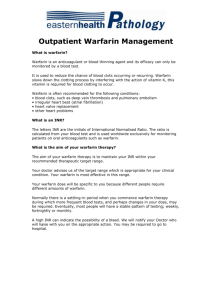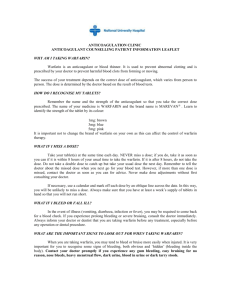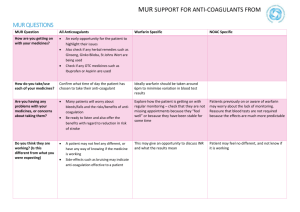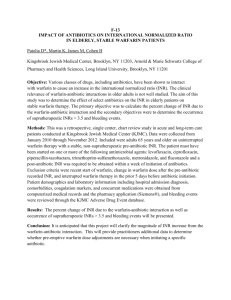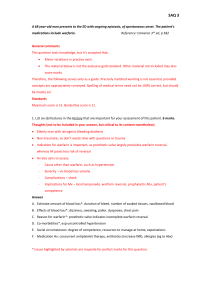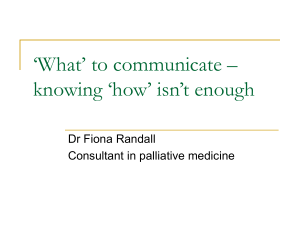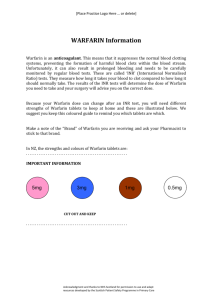Warfarin Information Brochure
advertisement
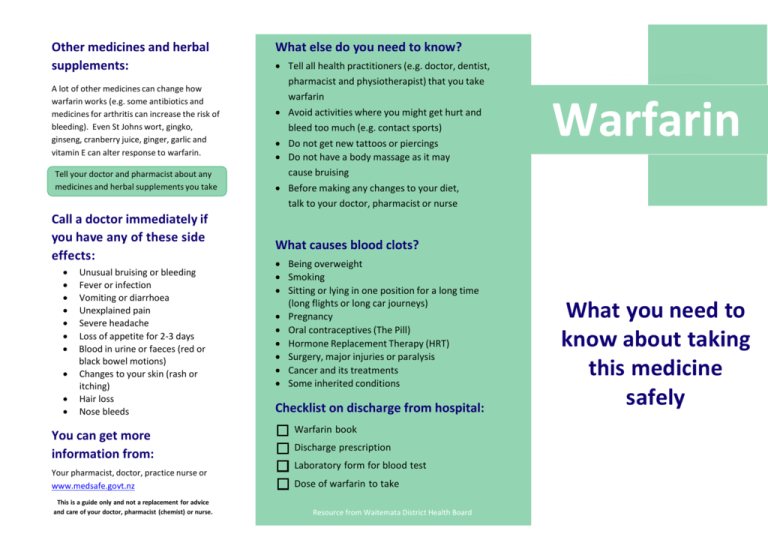
Other medicines and herbal supplements: A lot of other medicines can change how warfarin works (e.g. some antibiotics and medicines for arthritis can increase the risk of bleeding). Even St Johns wort, gingko, ginseng, cranberry juice, ginger, garlic and vitamin E can alter response to warfarin. Tell your doctor and pharmacist about any medicines and herbal supplements you take Call a doctor immediately if you have any of these side effects: Unusual bruising or bleeding Fever or infection Vomiting or diarrhoea Unexplained pain Severe headache Loss of appetite for 2-3 days Blood in urine or faeces (red or black bowel motions) Changes to your skin (rash or itching) Hair loss Nose bleeds You can get more information from: Your pharmacist, doctor, practice nurse or www.medsafe.govt.nz This is a guide only and not a replacement for advice and care of your doctor, pharmacist (chemist) or nurse. What else do you need to know? Tell all health practitioners (e.g. doctor, dentist, pharmacist and physiotherapist) that you take warfarin Avoid activities where you might get hurt and bleed too much (e.g. contact sports) Do not get new tattoos or piercings Do not have a body massage as it may cause bruising Warfarin Before making any changes to your diet, talk to your doctor, pharmacist or nurse What causes blood clots? Being overweight Smoking Sitting or lying in one position for a long time (long flights or long car journeys) Pregnancy Oral contraceptives (The Pill) Hormone Replacement Therapy (HRT) Surgery, major injuries or paralysis Cancer and its treatments Some inherited conditions Checklist on discharge from hospital: Warfarin book Discharge prescription Laboratory form for blood test Dose of warfarin to take Resource from Waitemata District Health Board What you need to know about taking this medicine safely What is warfarin? Warfarin is a medicine that helps slow the blood from clotting. It’s called an anticoagulant. The brands are Marevan® and Coumadin®. They cannot be used together. In New Zealand, Marevan® is usually used. Tell the pharmacist if your tablets look different What should you do if you forget a dose? Take the missed dose as soon as you remember if it is on the same day. If you do not remember until the following day, only take the dose you would normally take on that day. You should never take more than one dose a day. Tell your doctor about any missed doses How long do you need to take warfarin for? It depends on your condition. Your doctor will tell you how long you need to take it. Pregnancy: Why do you need warfarin? You need warfarin because you have, or are at risk of a blood clot. Clots are harmful; they can block the blood flow in an artery or vein. When should you take it? Take your tablets (as one dose), once a day, at the same time each day. Evening is best so you can have your blood test in the morning. Mark the calendar when you take your dose Warfarin should not be used during pregnancy; it can harm your baby. Talk to your doctor if you take warfarin and think you might be pregnant, or want to have a baby. Breastfeeding: Warfarin is safe in breastfeeding; it does not pass into the breastmilk. Your blood tests: You will need to have blood tests to measure how fast your blood clots. It is called the INR (International Normalised Ratio). The INR should be between 2 and 4. Your doctor will tell you: What INR level you should be aiming for What warfarin dose you need How often you need an INR blood test If you are in hospital, your blood will be tested there. When you are at home your doctor will give you a form to take to a laboratory when you need a blood test. When you get your blood tested: In the morning: Have your blood test at the laboratory In the afternoon: Ring your doctor or nurse; they will tell you what dose to take In the evening: Take your dose and keep a record (e.g. by marking the calendar) Your diet: Eat a balanced low fat diet. Some foods contain vitamin K which can affect how warfarin works (e.g. spinach, broccoli, lettuce, soya beans, beef, liver, alfalfa and green tea). Eat only small amounts of these. More than two standard alcoholic drinks per day can increase the risk of bleeding. Do not have any more than this.
